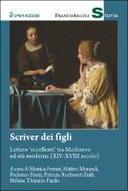Explore

Scriver dei figli
0 Ungluers have
Faved this Work
Login to Fave
Starting from the end of the Middle Ages and throughout the early modern era, there was a vast diffusion of the letter form, developed in the chancelleries of European courts and among elites according to canons that blended the rhetoric and chancery tradition with humanistic knowledge. The epistolary style suits the transmission of information and political decisions as well as a frequent exchange of everyday life news, revealing, at both public and private levels, a web of interpersonal relationships and, along with it, evidence of feelings that create ‘emotional communities’ to which, in many of the cases examined here, individuals looking for social recognition belong.
This book is included in DOAB.
Why read this book? Have your say.
You must be logged in to comment.
Rights Information
Are you the author or publisher of this work? If so, you can claim it as yours by registering as an Unglue.it rights holder.Downloads
This work has been downloaded 56 times via unglue.it ebook links.
- 56 - pdf (CC BY-NC-ND) at OAPEN Library.
Keywords
- Children's, Teenage & educational
- Education
- Educational devices in the court society
- Educational material
- Educational strategies during the Ancien Régime
- Educational: History
- Epistolary exchanges
- Epistolary novels
- History of childhood, Europe XIV-XVIII centuries
- History of Education
- History of education, Europe XIV-XVIII centuries
- History of educational historiography
- History of the family, Europe XIV-XVIII centuries
- Pedagogical practices for the élites
- Society & Social Sciences
- The ages of life and the construction of social roles
- thema EDItEUR::J Society and Social Sciences::JN Education::JNB History of education
- thema EDItEUR::Y Children’s, Teenage and Educational::YP Educational material::YPJ Educational: Humanities and social sciences, general::YPJH Educational: History
Editions

